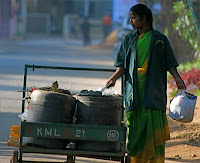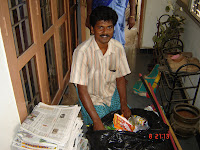Indian Companies bought by MNCs
Yes as you say there are many good Indian companies which were bought by MNCs, Thumbsup is a good example. As for cometics, Sunilk too was Indian, and the first to sell shampoo in sachet, they were bought by Clavin Klien in a good move. And why not talk about Sameer Bhatia selling away his Hotmail.
Indians could compete neither with the quality nor with the business skills of the outside world. And this would happen as long as we try follow their life style.
So, should we go back to use Shikkakai..!!! Maybe it too has its own users as Tender coconut, Ganna juice(sugar cane) and nimbu pani (lime) still have their say.
So, the solution may be promoting the traditional way into the mordern lifestyle and also at the same time developing technologies and skills to compete with the outside world.
If we feel the present generation who are good 'workeres/engineers' with the MNCs all over the world, could not compete in producing and marketing, with the MNC, we can groom our kids to be more disciplined and bold enough to emerge an entreprenuer.
Talking about promoting traditional ways, I have been living in Japan and South Korea, couple of years each, the colas couldn't get a strong hold there. Though these countries are developed and modern in all aspects, much of their traditional things are still used. When the Asian countries who adopted the culture from India could preserve it why can't we. And one of the most important economic strategy that we have to learn from these countries are, they consumed their own products and stabilised it domestically before opening up their country for the MNCs. Hyundai, LG, Samsung are such companies which first developed a strong domestic market without allowing the foreign brands to enter the country, thanks to their thoughtful government and the discplined and hardworking manpower with an attitude.
Indians could compete neither with the quality nor with the business skills of the outside world. And this would happen as long as we try follow their life style.
So, should we go back to use Shikkakai..!!! Maybe it too has its own users as Tender coconut, Ganna juice(sugar cane) and nimbu pani (lime) still have their say.
So, the solution may be promoting the traditional way into the mordern lifestyle and also at the same time developing technologies and skills to compete with the outside world.
If we feel the present generation who are good 'workeres/engineers' with the MNCs all over the world, could not compete in producing and marketing, with the MNC, we can groom our kids to be more disciplined and bold enough to emerge an entreprenuer.
Talking about promoting traditional ways, I have been living in Japan and South Korea, couple of years each, the colas couldn't get a strong hold there. Though these countries are developed and modern in all aspects, much of their traditional things are still used. When the Asian countries who adopted the culture from India could preserve it why can't we. And one of the most important economic strategy that we have to learn from these countries are, they consumed their own products and stabilised it domestically before opening up their country for the MNCs. Hyundai, LG, Samsung are such companies which first developed a strong domestic market without allowing the foreign brands to enter the country, thanks to their thoughtful government and the discplined and hardworking manpower with an attitude.
Labels: Indian company, MNC, Swadeshi





